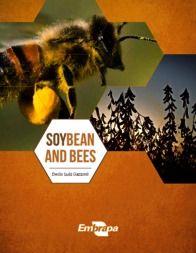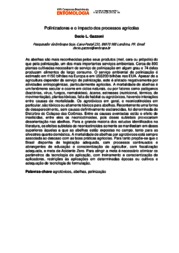Pollinator insects improve agricultural productivity
26/01/16
|
Research, Development and Innovation
Pollinator insects improve agricultural productivity
The increase in the quantity and diversity of pollinator insects such as bees in crop areas is an affordable and sustainable strategy to improve crop yields in small and large properties. The assertion is in the article "Mutually beneficial pollinator diversity and crop yield outcomes in small and large farms", published in the scientific journal Science on January 22, and is the fruit of an international study with Embrapa's co-participation.
The results published in the article are part of the project "Conservation and Management of Pollinators for Sustainable Agriculture through an Ecosystem Approach", which has the support of the Global Environmental Facility (GEF), the United Nations Environment Programme (UNEP), and the United Nations Food and Agriculture Organization (FAO), and is coordinated in Brazil by the Ministry of the Environment.
The study published in Science analyzed data collected in 33 crops that depend on pollinators to any extent, in 344 areas, in small and large properties in Africa, Asia and Latin America. Brazil included data collected from cashew, canola, apple, tomato, melon, and cotton crops, the last two of which were studied by Embrapa Semi-arid Region (Pernambuco) and Embrapa Genetic Resources and Biotechnology (Distrito Federal), respectively.
The results show that ecological intensification, which means increasing crop productivity through biodiversity management in the scientific jargon, may be a solution to increase food production, especially in poorer countries.
The data analysis has demonstrated that in smallholdings (areas that are smaller than two hectares), an increase in pollinator density leads to constant increase in productivity. Meanwhile, in large areas (fields with over two hectares), the benefits could only be detected when there was a wide diversity of species.
"Ecological intensification has been proposed by ecologists as a solution to uphold agricultural production in small areas. Smallholders, who do not have funds to buy inputs, can benefit from their very own local biodiversity to produce food", Carmen Pires, a researcher from Embrapa Genetic Resources and Biotechnology, explains. "Maintaining pollinator and other benefitial insects is like using a service that nature itself offers for free", she adds.
The authors also assert that a pollination should be deemed a critical input in cropland management, and that ecological intensification creates "win-win" scenarios between biodiversity and crop yields, thus contributing to the development of more sustainable agricultural systems.
Bees increase cotton productivity by 18%
Embrapa's contribution to the study focused on cotton and melon crops. While Carmen Pires studied cotton, the researchers Márcia Ribeiro and Lúcia Kill, from Embrapa Semi-arid Region, were dedicated to melon plant pollination. In cotton's case, the former scientist worked between 2010 and 2012 in three Brazilian biomes where the crop finds makor socioeconomic expression: Cerrado, Southern Amazon and Caatinga.
The studies were conducted in small and large properties, with and without the use of mechanization and agricultural inputs, and also in sites that adopt agroecological systems. Their results have shown that there is a great variety of bees visiting cotton flowers − nearly 130 species−, and that the presence of such insects is directly related to an 18% average increase in crop productivity.
"Cotton plants do not depend on bee pollination, but they benefit when they are visited by the insects, with increased productivity", researcher Carmen Pires explains.
Unlike in the cotton plants' case, bees are almost exclusively responsible for pollinating the flowers that turn into melons. When bees and other pollinators are present in quantities that are suitable to the size of the cultivated area, melon producers can rest assured of a good production.
The studies carried out by the researchers in the Brazilian Northeast resulted in the recommendation of best practices for beekeping and stingless beekeeping with the aim of improving melon production.
The information gathered by Embrapa and partner institutions resulted in the development of methodologies that demonstrate in practical terms for farmers that it is possible to implement more efficient cultivation techniques, based on management practices that increase pollinator diversity in plantations.
Loss of pollinators is a world issue
Research institutes from all over the world have detected a sensitive loss of pollinators at a global level. As they are responsible for transferring pollen from the anthers (male flower parts) to the stigmas (female flower parts), allowing for fecundation, several studies affirm that the main pollinators − birds, bats, beetles, butterflies, moths, and bees − are directy related to the pollinition of 75% of the crop varieties used for human consumption.
The study that originated the article published by Science magazine focused on countries that face the threat of food insecurity: Brazil, South Africa, India, Pakistan, Nepal, Ghana, and Kenya. Previous analyses that had indicated that pollination interferes with the production of more than 70% of all plant products were their starting point.
"Several studies have shown that the type of agricultural intensification that resorts to the use of chemical inputs, to the deforestation of native vegetation areas, and to the clearance of buffer zones that could work as refuges to the local fauna and flora, has led to a steep decline in pollinator populations", Luísa Carvalheiro, a researcher from the University of Brasília (UnB) Department of Ecology and coauthor of the article, has declared in an interview to the newspaper Correio Braziliense. "That constitutes a serious threat to agricultural productivity", she concludes.
The data shared by the Brazilian institutions participating in the research − UnB, Universidade Federal da Bahia, Universidade Federal do Ceará, Pontifícia Universidade Católica do Rio Grande do Sul, Universidade Federal de Sergipe, Jardim Botânico do Rio de Janeiro, Universidade Estadual do Norte Fluminense Darcy Ribeiro, Instituto do Meio Ambiente e Recursos Hídricos da Bahia, Universidade de São Paulo, Fepagro Vale do Taquari, and Embrapa − about the productivity gains related to the presence of pollinators are going to result in a national policy on pollinators in the near future.
Irene Santana (MTb 11.354/01/DF)
Embrapa Genetic Resources and Biotechnology
Press inquiries
irene.santana@embrapa.br
Phone number: (61) 3448-4769
Further information on the topic
Citizen Attention Service (SAC)
www.embrapa.br/contact-us/sac/



